|
De Argentijnse schrijver Héctor Bianciotti werd geboren op 18 maart 1930 in Córdoba. Zie ook alle tags voor Héctor Bianciotti op dit blog.
Uit:L'amour n'est pas aimé
« J'en vins à penser avec joie que la finalité secrète de ce monde était d'ordre purement esthétique et que les horreurs qui peuplent notre histoire sont un festin destiné au poète. […] … mais je pense néanmoins que cette foi pure en la magie d'un adjectif ou d'un adverbe – toujours si méprisés -, cette certitude qu'un adverbe ou un adjectif peuvent aller là où la raison ne parvient pas et peuvent laisser entrevoir l'impossible Vérité qui jusqu'alors s'était dérobé à toute recherche, fut en fin de compte un exercice utile qui allait me servir plus tard, quand j'aurais à décrire quelque chose d'immédiat avec une sorte de rhétorique de l'urgence. "
(…)
« C'est là – ce fut un bonheur et un éblouissement – qu'il découvrit un jour qu'il savait lire. C'est là qu'il connut la réclusion, dans une cave obscure à laquelle on le condamnait parce qu'il lisait avec plaisir et que tout plaisir est un pêché – mais dans l'obscurité il se prit pour Robinson et des ombres tapies dans les coins il se forgea des interlocuteurs avec lesquels il faisait commerce (la solitude du personnage ne l'attirait pas). C'est là qu'il trouva, en la personne de l'oncle Henry, vieux marin boiteux qui profitait de la présence de l'enfant pour continuer à s'émerveiller de ses anciennes prouesses, la première des innombrables figures de héros anonymes qu'il exalterait plus tard. C'est là qu'il sut – mais qui dira son désarroi ? - douter de ce qu'on tentait de lui inculquer : l’obsession de la faute, la notion d'un enfer toujours mérité que le moindre de ses gestes appelait, d'un Très-Haut omniscient qui tenait un livre de comptes – ce qui l'amena à découvrir les avantages de la méfiance, de la dissimulation, du mensonge, toutes choses qui sont peut-être finalement, dans ce monde provisoire, des vertus esthétiques."
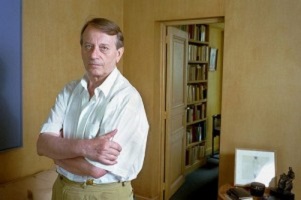
Héctor Bianciotti (18 maart 1930 – 11 juni 2012)
De Nederlandse schrijver Hellema (pseudoniem voor Alexander Bernard (Lex) van Praag) werd geboren in Amsterdam op 18 maart 1921. Zie ook alle tags voor Hellema op dit blog.
Uit: Bestekken
“Het is zaak dat wij ons nog eenmaal met het verleden bezighouden. Voor de dood - die ons toentertijd na stond als ons eigen vlees en bloed, maar van wie wij sindsdien vervreemd zijn - terugkeert en al onze tijd in beslag neemt. Misschien is er iemand die ons wil voorhouden dat wij er goed aan zouden doen ons - voor het te laat is - juist af te wenden van dat verleden; maar voor hij zich vergaloppeert, bedenkt hij dat van ons moeilijk kan worden verwacht onze gedachten te richten op wat ons aan toekomst rest. Misschien ook is er iemand die ons wil tegenwerpen dat wij ons al een leven lang - te lang - met niets anders dan juist het verleden hebben beziggehouden; maar voor hij dat uitspreekt, bedenkt hij dat dit verleden ons bezighield, ondanks ons zelf. En wij van onze kant herinneren ons de dagen waarop wij wakker werden met het voornemen ons - eindelijk - van dit verleden te ontdoen. Het was talloze malen herbeleefd, het was geheel doordacht, wij hadden gerouwd en ondervonden hoe vruchteloos de opstandigheid tegen de dood is. Kalme windstille dagen tussen de seizoenen waren het, waarop alles in de natuur elkaar ademloos in evenwicht lijkt te houden. En de avonden, voor het inslapen - gevreesd moment - waarop wij moesten toegeven dat het niet gelukt was en dat er andermaal in de coulissen van ons bewustzijn onrustige taferelen werden voorbereid voor de nacht. Wij herinneren ons de paniek toen de vraag zich opdrong of wij er wel ooit in zouden slagen onbevangen te leven als weleer. En wij herinneren ons de berusting waarmee wij inzagen dat het beter was ons met dit verleden te verstaan - een onontkoombare dialoog, een eindeloze uiteenzetting.
Wij. Want hoe verschillend onze belevenissen, hoe uiteenlopend het getal van ons verlies of het aantal van onze slachtoffers, geen die - toen de geschiedenis van Europa doormidden brak - op het breukvlak van de tijd stond, is afgezonderd.”

Hellema (18 maart 1921 – 19 maart 2005)
Amsterdam, Spaarndammerbuurt
De Duitse schrijver Christian Friedrich Hebbel werd geboren in Wesselburen op 18 maart 1813. Zie ook alle tags voor Friedrich Hebbel op dit blog.
Die Lerche
Ich kam in Ungarn durch ein Tal gefahren,
Von leichten Rossen schnell dahingetragen,
Und hörte über mir die Lerche schlagen,
Die durch den Äther zog, den bläulich-klaren.
Bald aber mußte ich erstaunt gewahren,
Daß sie zu mir hinabschoß in den Wagen,
Doch schien mir dies Vertraun zugleich ein Zagen
Vor einem andern Feind zu offenbaren.
Ich schaute auf und sah den Habicht hangen,
Der nicht gewohnt ist, Schwache zu verschonen,
Sie hatte Schutz gesucht auf meinen Knieen;
Ich aber dachte: daß das kleinre Bangen
Der Mensch dir einflößt, soll sich dir belohnen,
Und ließ sie ungefangen wieder ziehen!
Ein Reiseabenteuer in Deutschland
Es flog in X. mein Hut mir ab,
Natürlich über die Grenze,
Und als ich, ihn wiederzuholen, lief
Da gab’s vertrackte Tänze.
Ich durfte den deutschen Nachbarstaat
Nicht ohne Paß betreten,
Und da ich bloß spazierenging,
So hatt ich mir keinen erbeten.
Das tat ich nun, auch wurde ich
In Gnaden damit versehen,
Doch war’s um meinen armen Hut
Trotz alledem geschehen.
Der war schon längst im dritten Staat
Und blieb auch dort nicht liegen,
Ihn ließ der schadenfrohe Wind
Ein Dutzend noch durchfliegen.
Was half mir nun der gute Paß,
Den ich in X. genommen?
Zehn neue braucht ich in einem Tag,
Da war nicht nachzukommen.
Ich kaufte mir einen andern Hut,
Der Meister aber erwählte
Den Wiener Kongreß zum Schutzpatron,
Als ich mein Schicksal erzählte.
Vers und Prosa
Leichter wäre auf einmal der Vers, als die Prosa, geworden?
Schwerer ist er, wofern ihr ihn vortrefflich verlangt,
Denn mit jeglichem Reiz der Prosa muß er sich schmücken
Und mit dem höheren noch, den man an ihr nicht vermißt.
Wenn ihr ihm einen erlaßt, so wird’s euch der Dichter nicht danken,
Denn ihr ebnet dadurch einzig dem Stümper die Bahn.
Aber, so seid ihr, ihr setzt, damit nur jeder ein Künstler
Heiße, ruhig die Kunst unter sich selbst erst herab,
Und da pfeifende Knaben das Nichts nun zu leisten vermögen,
Das ihr fordert, so denkt ihr sie euch selbst als ein Nichts!
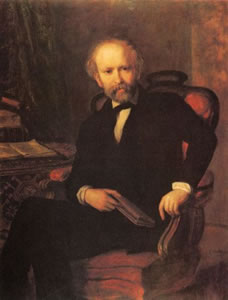
Friedrich Hebbel (18 maart 1813 - 13 december 1863)
Portret door Karl Rahl, 1855
De Australische schrijver Max Barry werd geboren op 18 maart 1973 in Melbourne. Zie ook alle tags voor Max Barry op dit blog.
Uit: Company
“Perched at the top is the word ZEPHYR and the corporate logo, which is an orange and black polygon of foggy intent. Orange and black crops up a lot at Zephyr Holdings; you can’t walk down a corridor, visit the bathroom, or catch an elevator without being reminded whose turf you’re on. There’s a logo on each panel of the lobby’s sliding glass doors, and when you’re through them, logos adorn the walls at intervals of three feet. A water feature of dark stones and well-tended ferns is a small, logo-free oasis, but to make up for this, the reception desk is practically a logo with a sign-in sheet on top. Even under soft, recessed lighting, the reception desk delivers such a blast of orange to your retinas that long after you’ve left it behind, you can still see it when you blink.
On one side of the lobby is an arrangement of comfortable chairs and low-slung tables, where visitors browse Zephyr’s marketing literature while waiting for whomever they’re meeting. Sitting there with his hands in his lap is young, fresh-faced Stephen Jones. His eyes are bright. His suit glows. His sandy-brown hair contains so much styling mousse it’s a fire risk, and his shoes are black mirrors. This is his first day. So far he’s been shown a series of corporate induction videos, one of which contained glowing buzzwords like TEAMWORK and BEST PRACTICE rocketing at the screen, and another of which featured actors from the late 1980s talking about customer service. Now he is waiting for someone from the Training Sales department to come and collect him.
He accidentally catches the eye of the receptionist for about the fourteenth time and they both smile and look away. The receptionist is GRETEL MONADNOCK, according to her nameplate; she’s quite young, has long, lustrous brown hair, and sits on the right side of the desk. On the left a nameplate says EVE JANTISS, but Eve herself is absent. He is a little disappointed about this, because while Gretel is nice, when he was here for his job interview and first saw Eve, he almost dropped his new briefcase. It would be an exaggeration to say he took a job at Zephyr because of the beauty of its receptionist, but during his interview he was very enthusiastic.”
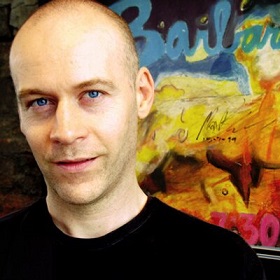
Max Barry (Melbourne, 18 maart 1973)
De Oostenrijkse schrijver en dichter Wolfgang Bauer werd geboren op 18 maart 1941 in Graz. Zie ook alle tags voor Wolfgang Bauer op dit blog.
Uit:Magic afternoon
“BIRGIT: Was tun wir jetzt am Abend? (setzt sich neu frisiert aufs Bett und raucht eine neue an)
CHARLY: Wie spät wirds jetzt sein?
BIRGIT: Was weiß ich ...?
[...] Wir können ja abends gar net so viel machen
...
CHARLY: Gar nichts [...] Glaubst, kriegst du von deiner Mutter ein Geld?
[...] BIRGIT: Da komm ma net weit.
[...] CHARLY: Baden gehen zahlt sich auch net aus
...
[...] BIRGIT: Hast du noch was zum Essen?
CHARLY: Ja ... irgendwelche Brote.
BIRGIT: Wurst ist aber keine ...
CHARLY: Irgendetwas muß noch sein ...
[...] BIRGIT: Is was im Kino? [...] Is was im Theater?
[...] CHARLY: I bleib zuhaus und schreib was [...] dann schlaf halt ... oder geh vielleicht arbeiten ...
BIRGIT: Ich kann mir gar nicht mehr vorstellen, daß ich arbeite ... unmöglich ... i fühl mi recht wohl, obwohl i zu nix Lust hab ..."
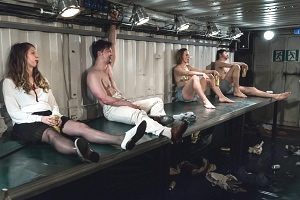
Wolfgang Bauer (18 maart 1941 – 26 augustus 2005)
Scene uit een opvoering in Keulen, 2016
De Amerikaanse romancier Richard Thomas Condon werd geboren op 18 maart 1915 in New York. Zie ook alle tags voor Richard Condon op dit blog.
Uit: The Manchurian Candidate
“He had snarled that maybe they would prefer it if he started out by asking what was the great man’s hobby and what astrology sign he had been born under. It was hard to believe but that man’s face had been as pocked and welted as a waffle, yet he was one of the biggest names in the business, which gives an idea what those swine will do to kid the jerky public. The actor had said, “Are you scared, kid?” Then, after that, everything seemed to go O.K. They got along like a bucket of chums. The point was, everybody had to start someplace.
Although he felt like a slob himself for doing it, he asked Mr. Mavole and the girl if they would have time to have a cup of coffee at the airport restaurant because he was a newspaperman himself and he knew that the little lady had a story to get. The little lady? That was overdoing it. He’d have to find a mirror and see if he had a wing collar on.
“You were?” the girl said. “Oh, Sergeant!” Mr. Mavole said a cup of coffee would be fine with him, so they went inside.
They sat down at a table in the coffee shop. The windows were steamy. Business was very quiet and unfortunately the waitress seemed to have nothing but time. They all ordered coffee and Raymond thought he’d like to have a piece of pie but he could not bring himself to decide what kind of pie. Did everybody have to look at him as though he were sick because he couldn’t set his taste buds in advance to be able to figure which flavor he would favor before he tasted it? Did the waitress just have to start out to recite “We have peach pie, and pumpk—” and they’d just yell out Peach, peach, peach? What was the sense of eating in a place where they gabbled the menu at you, anyway? If a man were intelligent and he sorted through the memories of past tastes he not only could get exactly what he wanted sensually and with a flavor sensation, but he would probably be choosing something so chemically exact that it would benefit his entire body. But how could anyone achieve such a considerate deliberate result as that unless one were permitted to pore over a written menu?”
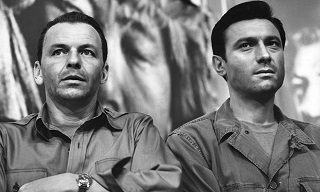
Richard Condon (18 maart 1915 – 9 april 1996)
Frank Sinatra als Bennett Marco en Laurence Harvey als Raymond Shaw in de gelijknamige film uit 1962
Zie voor nog meer schrijvers van de 18e maart ook mijn vorige blog van vandaag.
|



